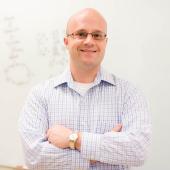
Each year, the previous year's Andreas Acrivos Award for Professional Progress in Chemical Engineering recipient is invited to deliver a special plenary. The plenary session is typically chaired by the previous lecturer (winner from two years previous).
The 2024 Andreas Acrivos Award Lecture will be delivered by 2023 award recipient Hal S. Alper, Cockrell Family Regents Chair in Engineering #1, The University of Texas at Austin.
See Founding Donors

About the Andreas Acrivos Award for Professional Progress in Chemical Engineering
In honor of one of the chemical engineering profession’s most influential leaders and one of the great fluid dynamacists of the 20th century, the American Institute of Chemical Engineers (AIChE) has renamed the Professional Progress Award the Andreas Acrivos Award for Professional Progress in Chemical Engineering.
The award recognizes outstanding progress in the field of chemical engineering. The awardee will have made a significant contribution to the science of chemical engineering through one of the following means:
- A theoretical discovery or development of a new principle in the chemical engineering field.
- Development of a new process or product in the chemical engineering field.
- An invention or development of new equipment in the chemical engineering field.
- Distinguished service rendered to the field or profession of chemical engineering.
The recipient is invited to deliver an address at the next Annual Meeting.
Engineering Biology to Develop “a Taste for Waste”
Hal Alper, Cockrell Family Regents Chair in Engineering #1, The University of Texas at Austin
Chemical sustainability requires a fully circular economy. The valorization and remediation of waste (whether anthropogenic, environmental, or industrial) using biology presents itself as a viable route for both environmental stewardship and sustainable industrial bioproduction. This approach is becoming more feasible thanks to advances in metabolic strain engineering, synthetic biology, and machine learning. This talk will cover examples of how microbial systems and enzyme can achieve the goal of sustainable chemical production and waste valorization by rewiring biology to develop “a taste for waste”. Highlighted examples include plastic waste depolymerization, unconventional carbon utilization, and feedstock expansions to include unique waste sources. Underlying metabolic and protein engineering principles will be highlighted through these examples. Collectively, this work helps to usher in a new approach for biologically-enabled sustainability.
